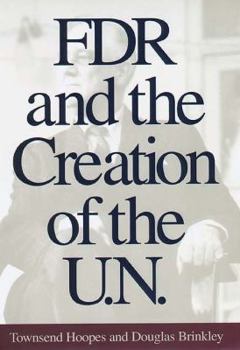FDR and the Creation of the U.N.
Select Format
Select Condition 
Book Overview
In recent years the United Nations has become more active in--and more generally respected for--its peacekeeping efforts than at any other period in its fifty-year history. During the same period, the... This description may be from another edition of this product.
Format:Hardcover
Language:English
ISBN:0300069308
ISBN13:9780300069303
Release Date:March 1997
Publisher:Yale University Press
Length:287 Pages
Weight:1.70 lbs.
Dimensions:1.1" x 6.4" x 9.4"
Customer Reviews
2 ratings
Excellent Book on the Purpose of the U.N. and Today's Issues
Published by Thriftbooks.com User , 20 years ago
60 million people died in World War II. 18 million died in World War I. The financial costs were huge. Franklin Roosevelt was determined to prevent a third world war, and to foster stability and prosperity in the world. His plan worked, though the U.N. has not unfolded as he envisioned.This insightful book examines the creation of the U.N. and today's issues. Below is an abbreviated review by H-Net I found on the Internet:----Begin quoteReviewed by Matthew S. Magda, Sacred Heart University.Published by H-USA (December, 1997)FDR and the Creation of the U.N.The United Nations has received renewed attention since the end of the Cold War. In the early 1990s, especially following the success of the U.N.-authorized coalition against Iraq's military seizure of Kuwait, hopes rose among internationalists that the United Nations would now play its proper role as primary deterrent of international aggression. No longer fettered by the rivalry between the most powerful members of its Security Council, the United Nations could begin functioning as the guarantor of international peace and prosperity... Currently, Americans are involved in both rational and emotionally-charged discussions about the future role of the United Nations and its potential impact on U.S. foreign policy... There are those who argue that a strong United Nations is essential because it will serve the long-term interests of the United States to have an institution with legitimate international credentials to turn to for help in settling conflicts and subduing threats to global stability. This latter view is shared by the authors of FDR and the Creation of the U.N. In the Preface of their book, Townsend Hoopes and Douglas Brinkley tell readers that they hope to add needed historical perspective to the current debate on the future role of the United Nations. They believe that by doing so, they will remind Americans and others of the vital role played by Franklin D. Roosevelt and the United States in the creation of the United Nations. Finally, they seek to elevate understanding and discussion so that Americans would come to a more reasoned and consistent support for an institution which "embodies the highest hopes of mankind" Hoopes and Brinkley explain how the failure of the League of Nations shaped the ideas of FDR and American policymakers... The absence of a strong League enabled aggressor states to pursue expansionist policies which eventually led to World War II. Therefore, FDR was determined that the mistakes of the past would be avoided. He wanted the United States to be a leader in the formation of a postwar international security organization. ... Hoopes and Brinkley believe that international peace depends on the formula first developed by FDR: a United Nations organization firmly backed by the United States. Such a formula worked well to deter aggression in Korea in the early 1950s and in the Persian Gulf in the 1990s. FDR and the Creation of the U.N. is well written and its cen
Detailed book for anyone seriously interested
Published by Thriftbooks.com User , 24 years ago
While this book would be leisure reading to only the most dedicated UN or FDR follower, it is one of the best books I could find for a report on the subject. The book is quite thorough and the different aspects the authors discussed gave me a greater understanding of the process. Many of the decisions made prior to the creation of the UN were delicate with the opposing desires of Roosevelt, Churchill, and Stalin. This book explains how Roosevelt contributed along with other factors that affected his moves including early influences from Wilson's League of Nations. Although this book would not be for everybody, it is a must read for those with a genuine intrest--or a school report--on this subject.





